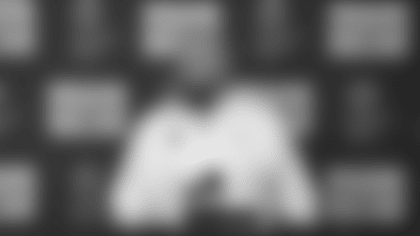Head Coach Brian Daboll
Q: You're really against that whole idea of keeping track of what's going on and recognizing the playoffs. Why?
A: You got to focus on what's ahead of you, which is what the most important thing is – which is not easy to do for people that work; players, coaches, organizations. Does no good looking four weeks ahead, three weeks ahead. You got to focus on what's the most important, that's just what I believe in.
Q: How are (outside linebacker) Jihad Ward and (wide receiver) Richie (James)?
A: I think they'll take another step today and hopeful for both of them. But we'll see once they finish going through the protocol.
Q: With Richie, obviously the doctors are going to make their decision but with two concussions in a short period of time, does that add any apprehension?
A: Yeah, I'll let the medical experts handle that.
Q: Any doubt about (defensive lineman) Leonard (Williams) being able to play this week?
A: I'd say normal Friday with guys that we will make decisions on. Go through today, see where we're at and then discuss it tonight.
Q: It seems like (defensive lineman) Dexter (Lawrence II) has played an awful lot of snaps this season and really effectively. What strikes you about him?
A: He's a good player for us. Centerpiece of the defense. He's strong on the inside. I'd say he rushes the passer well, affects the quarterback. Stops the run. Things that a good defensive tackle needs to do. He's been a good leader for us.
Q: (Defensive coordinator) Wink (Martindale) liked him in the draft, so he liked him before he was with the Giants obviously. Did he make any of that aware to you in terms of conviction about Dexter back then?
A: When we got here, we evaluated all the players we have. We watched them on tape and figured which places we could put them to suit our defense or suit our offense. He's done a good job for us.
Q: Do you feel pressure?
A: No, I just get ready to play a game.
Q: You don't feel any differently coaching in a playoff game versus a December game versus a September game?
A: I've coached in all of them. I've coached when I was 2-14. I've coached in Super Bowls, not obviously as a head coach. A national championship. I've coached when we were not very good. Again, the hard part that goes back to your question is trying to keep the main thing the main thing. That's what I try to do.
Q: For you, the head coaching job, does that change at all? I know you're all about your consistency but the losing versus the winning – is there anything you notice or difficulties for you with that?
A: No, I just think you're always teaching. You're teaching (during) adversity. You're teaching when you do well to remain consistent and keep the main thing the main thing. I know it's a boring answer, but it was kind of how I was raised in this business, it's what I believe in, and I think it's important.
Q: When you have a rematch being so close, do you look more at what you need to fix from that game or what you need to adjust? You know what I mean?
A: No, I do. Probably everything. You watch it – I don't know how many times you watch it over and over again. Was that the right decision? Were we doing the right stuff? How was the matchups? What do we need to change? What worked good? Can we disguise stuff to make it look the same? There's a whole, when you have one game - when you play a team twice, you spend a lot of time looking at that first tape. For us, we watched all these other games not too long ago. I'd say it's a thorough evaluation of that tape.
Q: How many times would you estimate you actually watched that tape of that game with you guys against them in the last two weeks?
A: A lot. I couldn't tell you a number.
Q: Are we talking like more than 10?
A: Yeah.
Q: What plays haunted you the most after watching?
A: There's always a lot. A bunch of them. There's usually, when you're in close games like that, there's four or five plays. You don't know when they're going to happen, it could have been in the fourth quarter, first quarter that if you make them, it gives your team a much better chance to win when those close games are 20-20, 17-14. There's always one play here or there. You never know when it's going to be. Usually about four, five, six of them. Learned that from coach (Marty) Schottenheimer.
Q: Why is important not to play up the magnitude of this game?
A: I just think it's important to do the things you need to do to get ready to play the game. Again, I've been in a wide variety of situations as an assistant, as a coordinator and I'm not saying it's right or wrong, that's just my philosophy. Let's focus on what we can control and that's the most important (thing). How we prepare, ultimately how we go out there and play and coach, that's what really makes the difference. What if this happens? None of that really matters.
Q: Since it's a divisional opponent you played not too long ago do you streamline your playbook, or do you expand it?
A: It's pretty consistent with what we've done. Are you asking like how many plays we have on the call sheet or calls?
Q: Yeah.
A: I'd say it's really consistent. It might not be the same exact calls, but you don't add 40-50 plays or take away 20-30 plays. We always have about a number that we think is good and then you have to make adjustments as the game goes.
Q: What do you do if (offensive coordinator Mike) Kafka doesn't get his voice back for Sunday?
A: He will. I gave him some cough drops today. (Laughs)
Q: How are you feeling?
A: In what regard?
Q: Health?
A: I mean, (points to stomach, laughs). That's a setup question (laughs).
Q: You've talked about it, the lack of big runs. (Running back) Saquon (Barkley) kind of said the same with he hasn't been getting the explosive plays. What makes you think that you guys are close to getting them? That they're on the verge of coming?
A: You go through the week of practice, you put in plays that you think are going to work and then ultimately, you've got to go out there and execute them. You've got to block it well, you've got to run well, you've got to make the right checks, it's really a team thing. All of us, coaches, players, everybody.
Q: How is Washington so good on run defense when they play a lot of nickel and dime, two-high, that's usually the stuff that you can run against, so what makes them able to still stop the run?
A: Well, they have four first-round defensive lineman. I think the trenches is where it starts, whether it's the offensive line or the defensive line of teams. When you're strong up front, that's a big benefit to you.
Q: Is (defensive end) Chase Young at a level where you have to address him personally with any of the group?
A: Yeah. Again, how many snaps he plays, doesn't play, we don't know that, but he's certainly a good player. Coached against him before. Those edge rushers that are dominant players you always have to have a plan for them.
Q: I asked Kafka this yesterday, Washington is so good at controlling possession and the ball. On offense, how much do you have to try and keep the ball versus also just moving down field and scoring?
A: Scoring, I'd say, is the number one thing. It always is. You go back and watch the game and the way I watch is all the way through. We did a good job in the red zone and the fringe, particularly in the second half. They're getting 8:30 minute drives and then you go to the offensive side, and you haven't had the ball for so long. Again, third downs will be critical for us. Obviously, every down is, but creating good situations for ourselves on third down or skipping those third downs. That will go a long way.
Q: Where are you at with (guard Ben) Bredeson?
A: Had another good day. I'd say he's in the (defensive lineman Leonard Williams) Leo category of let's see what happens today.
Q: How big of a role do you expect (safety) Landon Collins today?
A: Well, we didn't make any of those decisions quite yet. All those practice squad players that I would say we can bring up, (general manager) Joe (Schoen) and I will talk about that tonight. I'd say there's always a possibility of four or five each week. We'll make that decision tonight.














